Premium
GBV survivors find solace in Kenya's limited safe houses

For survivors like Mary, safe houses are not just a refuge. They are home.
What you need to know:
- For survivors like Mary, safe houses are not just a refuge. They are home.
- Pauline Juma’s story reads just like Mary’s, and starting Rebirth of a Queen was a way of giving back to her 16-year-old self.
- Founded in 2019, the organisation is dedicated to empowering teenagers and young women survivors of GBV.
- It opened its first safe house in December 2020 in Kajiado.
“No one leaves home unless home is the mouth of a shark” is a poignant line from the poem Home by Somali British writer Warsan Shire. It is a fitting metaphor for the story of Mary*, 18, who left home at 16 to escape from her father, who was also her abuser.
“The abuse started when I was in Class Five. I did not even recognise that it was abuse until I was a teenager. At about 16, I was introduced to sex work. I did that to survive, but I hated it. I needed to take a break from it all,” says Mary.
Her quest for a better life led her to Facebook, where she met Pauline Juma, the director of Rebirth of a Queen, an organisation that runs a safe house.
When Mary reached out to Pauline on Facebook, it had not crossed her mind that she could leave her home, but Pauline’s words changed her perspective.

Pauline Juma is the director of Rebirth of a Queen, an organisation that runs a safe house in Kajiado.
“I read the poems she had posted about being a GBV survivor and went to her inbox and poured my heart out to her. She said I could go and visit her. I had asked her if I could visit her for one week to take a break from my life, but when I arrived, she told me that I was not going back home and that she would take care of me,” says Mary.
Used poetry to communicate
“I love writing poetry because it is what connects me to survivors. It’s what connects me to healing, and this makes me fulfil this vision with passion,” explains Pauline.
The visit Mary had requested became a two-year stay.
“I feel loved and understood here. The only thing I would like to tell victims out there is not to stay quiet. Speak up.”
Mary is pursuing photography classes and modelling. These two activities will help her get back on her feet financially.
For survivors like Mary, safe houses are not just a refuge. They are home.
Pauline Juma’s story reads just like Mary’s, and starting Rebirth of a Queen was a way of giving back to her 16-year-old self. Founded in 2019, the organisation is dedicated to empowering teenagers and young women survivors of GBV.
It opened its first safe house in December 2020 in Kajiado.
Standing in the gap
She decries the lack of support from the government as “they only call you when they have a case”.
Safe houses for GBV survivors are catered for in the law through Witness Protection Agency. Still, a request needs to be made by the Directorate of Criminal Investigation officer investigating the case.
Kenya currently has a two government-run safe houses in Makueni and Bungoma counties. This is 45 short of the target, as part of President Uhuru Kenyatta’s commitment in the Generation Equality Forum in Paris, in June 2021, was to have one in every county.
The law states that people under threat need to be protected. And there has been some progress made in this area, which will be expounded on later.
Rebirth of a Queen is just one of the many organisations that are stepping in the gap left by the government. Others are Human Trafficking Trust East Africa, Undugu Society of Kenya, and Maisha Girls, among others. The Centre for Rights Education and Awareness (CREAW) partners with existing safe houses.
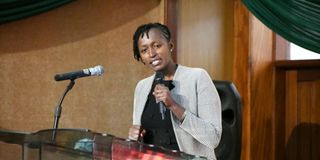
The executive director of CREAW, Wangeci Wachira.
“CREAW has a toll-free line. We give legal and psychosocial support. We also do cash transfers to women who are survivors. But even if you give someone all this and they go back to the same home where there’s violence, it can be futile, and that’s where the safe houses come in. We refer them there to get support,” says Wangeci Wachira, the executive director of CREAW.
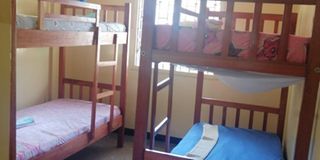
An image of the rooms in one of the shelters CREAW refers survivors to.
Mutuku Nguli, the executive director of Counter Human Trafficking Trust East Africa, agrees that the number of safe houses is limited, especially in far-flung areas like North-Eastern Kenya. He adds that local communities sometimes stigmatise women who seek help from safe houses, and when perpetrators find out where they have gone, they sometimes go there on revenge missions.
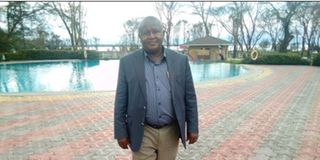
Mutuku Nguli, the executive director of Counter Human Trafficking Trust East Africa.
“When the women who’ve been victims come to our safe houses, they are usually broken and feel helpless. We work with counsellors to rebuild their self-esteem and confidence before we work on their reintegration,” says Mutuku. He contends that the best way to reduce the high prevalence rates of GBV is to address the triggers.
A legal perspective
Eric Mukoya, the Executive Director of Undugu Society of Kenya, which runs a safe house for children in Kitengela, holds that one of the biggest hindrances to the existence of safe houses in Kenya is the fact that it is capital expenditure- needing substantial financial commitment, which most sponsors and donors are not willing to get into.
“Donors want to fund programmes, not infrastructure,” he asserts, adding that ideally, the problem of limited safe houses should be addressed by the government.
Medical safe houses like Gender Recovery Centres -- such as the Nairobi Women’s Hospital, Level 5 hospitals in different counties and Policare Centres (housed at Police Stations) -- are one of the three categories of safe houses as outlined by Eric, who is also an advocate with over 17 years’ experience.
The other category is the safe houses run by NGOs and religious institutions, and the third is the privately owned safe houses like friends and relatives’ extra rooms.
“For example, a GBV survivor can approach a friend or relative for help, and the only way the law comes in is through a restraining order against the perpetrator. However, what this does not take care of is the fact that the perpetrator can hire goons to harm the survivor, and that is a huge gap.”
In July 2020, President Uhuru Kenyatta ordered an investigation into rising reports of violence against women and girls - including rape, domestic violence, female genital mutilation (FGM) and child marriage - due to Covid-19 restrictions.
He directed the National Crime Research Centre to prepare an advisory to security agencies on remedial action within 30 days and immediately prosecute all violators.
The National Crime Research Centre, in its report titled: Protecting the Family in the Time of Covid-19 Pandemic: Addressing the Escalating Cases of Gender-Based Violence, Girl Child Disempowerment and Violation of Children Rights in Kenya (2020), recommended that there is need for the establishment of One-Stop Centres for survivors of GBV across the 47 Counties.
The report also recommended that governors need to prioritise: advocacy against secret relationships/sponsors; integration of services in reporting, referral, tracking, intervention and placement of victims and survivors in safe shelters; and social services related to smooth access to health services (such as Linda Mama programme) by teen or child mothers.
But some of these recommendations, including the one on safe houses, still remain pending in terms of implementation.
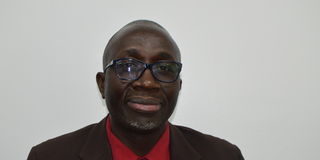
Eric Mukoya, the Executive Director of Undugu Society of Kenya.
Eric explains that a survivor can only be led to a safe house through court directives from a magistrate. Or sometimes, in emergency scenarios, a police occurrence book (OB) report could be used, as the survivor awaits formal court proceedings. Information about safe houses and likely recommendation(s) in particular jurisdictions is often shared in Court Users Committees’ (CUC) meetings, where magistrates or judges, who are heads of court stations, provide leadership. The CUCs act as an accountability forum especially because safe houses deal with vulnerable violence survivors.
He emphasises that safe houses are a temporary measure as the survivor still needs to be reintegrated into society.
Progress in law
In the matter of integrating safe houses into the law, the Nairobi County Government has made substantial progress in this, and on November 1, 2021, Nairobi City County Acting Governor H.E Ann Kananu Mwenda signed into law the Sexual Gender Based Violence (SGBV) Bill at City Hall Nairobi.
It "seeks to establish an interconnected reporting and referral system that will guide survivors on where to seek help. Its overall role is to accelerate efforts towards the elimination of all forms of GBV in Nairobi County and ensure perpetrators are severely punished".
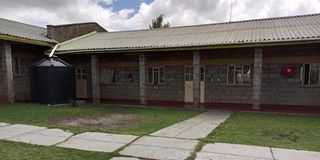
An outside view of a safe house run by Undugu Society of Kenya in Kajiado.
The law also proposes that the County government establishes safe houses in at least one of the 17 sub-counties in Nairobi to guarantee the safety of victims while their cases are being prosecuted, ensuring budgetary allocation for the facilities and witness a protection programme.
GBV survivors may find some reprieve with the law in place, and Eric recommends that the Ministry of Health and Interior should work in partnership to solve the problem of few safe houses. He contends that the civil society, to which he belongs, does their bit, but this must be a public discussion for progress to be made.




